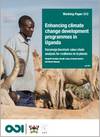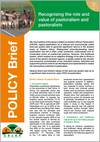Progressive control pathways (PCPs) are stepwise approaches for the reduction, elimination, and eradication of human and animal diseases. This article outlines a PCP for tsetse - transmitted animal trypanosomiasis, the scourge of poor livestock keepers in tropical Africa.
Initial PCP stages focus on the establishment of national coordination structures, engagement of stakeholders, development of technical capacities, data collection and management, and pilot field interventions. The intermediate stage aims at a sustainable and economically profitable reduction of disease burden, while higher stages target elimination. The mixed - record of success and failure in past efforts against African animal trypanosomiasis (AAT) makes the development of this PCP a high priority.
Year of publication: 2017
Organization: Organisation des Nations Unies pour l'alimentation et l'agriculture (FAO), Auteurs individuels
Topic: Services de santé
Language: English
Type of document: Technique
Geographical coverage: Global
Climate change will have significant impacts on economic activity and value chains in Uganda. But it can also provide new possibilities for people and businesses – for example, to create new products and services, develop new markets and access new funding streams and finance mechanisms.
The semi-arid Karamoja region in the northeast of Uganda accounts for around 20% of Uganda’s total livestock. This paper identifies and explores the economic opportunities for entrepreneurs and companies to invest in climate change adaptation to enhance the resilience of Karamoja’s livestock value chain. Investment in this sector can reduce the vulnerability of pastoralists to climate change and contribute to national development goals.
Year of publication: 2017Organization:
Topic: Changement climatique, Économie, Innovation, Organisation, Résilience, Value addition
Language: English
Type of document: Technique
Geographical coverage: Afrique orientale
This film highlights economic opportunities for investment in the development of the livestock sector in the Karamoja region of Uganda that are both inclusive and climate-resilient. It contributes to a paradigm shift perceptions of pastoralism, moving away from seeing it characterised by poverty, drought and famine to a livelihood characterized by opportunity, trade and resilience.
Year of publication: 2017Organization: ,
Topic: Changement climatique, Résilience, Value addition
Language: English
Type of document: Vidéos
Geographical coverage: Afrique orientale
This is a summary of a study, commissioned by the Alliance for Food Sovereignty in Africa (AFSA) on pastoralism-related policy in the Horn of Africa and East Africa. The aim of the desk review study was to identify and analyse policy and regulatory frameworks in the Intergovernmental Authority on Development (IGAD) and East African Community (EAC) regions, and their implications for the practice of pastoralism, and food sovereignty, so as to inform civil society and pastoralist groups’ advocacy. Several conclusions were drawn based on the review and analysis which were then used to inform the recommendations that were made.
Year of publication: 2017Organization: L’Alliance pour la souveraineté alimentaire en Afrique
Topic: Sécurité alimentaire
Language: English
Type of document: Technique
Geographical coverage: Afrique orientale
Pastoralism is a rational and viable economic land-use system able to generate significant returns in the dryland areas of Eastern Africa. Widespread misunderstanding about pastoralism has left it often under-protected, undervalued and an unintended victim of uninformed policies. However, this traditional livelihood system, which evolved as an adaptive strategy for thriving in some of the world’s harshest regions, is ideally suited to the climatic and economic uncertainties of our turbulent century. Therefore, informed and supportive policies need to be developed and implemented to realise the tremendous potential of pastoralism. This policy brief aims to facilitate informaed policy making by elaborating the direct and indirect values of pastoralism.
Year of publication: 2017Organization:
Topic: Changement climatique, Économie, Services environnementaux, Les savoirs autochtones, Régime foncier, Résilience
Language: English
Type of document: Technique
Geographical coverage: Afrique orientale
This report studies the policy and regulatory frameworks in IGAD and EAC regions of Africa, so as to inform advocacy by civil society and pastoralist groups in the two regions. It explains the link between food sovereignty and pastoralism, outlines the major regional policies related to pastoralism in the Horn and Eastern Africa, and discusses the challenges and opportunities related to these policies. It looks at the role of civil society organisations (CSOs) in articulating pastoralists’ concerns to policy frameworks at all levels and suggests how pastoralist communities, CSOs and other stakeholders could take advantage of the regional policies to advance the cause of food sovereignty.
Year of publication: 2017Organization: Auteurs individuels
Topic: Sécurité alimentaire, Peuples autochtones, Organisation, Participation
Language: English
Type of document: Technique
Geographical coverage: Afrique orientale
New fringe pastoralism : conflict and insecurity and development in the Horn of Africa and the Sahel
This report focusses on some new fringe activities that have developed among pastoralists such as cross-border trade and trafiicking and smuggling. It sees these activities as emerging from a changing relationship between the pastoralists, the state, and their national and transnational mobility. Although undertaken by only a handful of pastoralists, these activities have far-reaching national, regional and global impacts.
This report is not a conventional study of pastoral socioeconomic production and reproduction systems as a whole, but instead is limited to exploring some new fringe activities with consequences for the present and future of pastoralism as a resilient and ever adaptive way of life despite the pressures and myriad of challenges it faces.
Organization: Auteurs individuels
Topic: Conflit, Économie, Finance, Résilience
Language: English
Type of document: Technique
Geographical coverage: Afrique du Nord, Afrique occidentale, Afrique centrale, Afrique orientale, Afrique australe
This report looks at transhumant (or nomadic) pastoralism – the movement of livestock from one place to another between wet and dry seasons – and the dynamics of conflicts between farmers and pastoralists, which have steadily increased in Nigeria in recent years. It outlines the causes of increased pastoralist-farmer tensions as well as the position of pastoralists in Nigeria. It explores the challenges to developing conflict prevention mechanisms at local and national levels, and identifies potential entry points for doing so.
Year of publication: 2017Organization: Auteurs individuels
Topic: Conflit
Language: English
Type of document: Technique
Geographical coverage: Afrique occidentale









